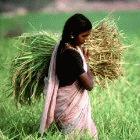 Rice harvests increased dramatically in India and parts of Asia during the “Green Revolution” of the 1960s and 70s. However, harvest growth has slowed since the mid-1980s, raising concerns that food shortages might once again return to plague these densely populated regions.
Rice harvests increased dramatically in India and parts of Asia during the “Green Revolution” of the 1960s and 70s. However, harvest growth has slowed since the mid-1980s, raising concerns that food shortages might once again return to plague these densely populated regions.Maximilian Auffhammer at UC Berkeley’s College of Natural Resources along with V. “Ram” Ramanathan and Jeffery Vincent, researchers at UC San Diego compared historical data on rice harvests in India to the presence of atmospheric brown clouds (ABCs), which form soot and other fine particles in the air (collectively termed aerosols), and greenhouse gases such as carbon dioxide.
Ramanathan, a professor of atmospheric sciences at Scripps Institution of Oceanography had previously led a team of international scientists in a study of the effect of increased “brown cloud” pollution on the Indian subcontinent. The conclusion from that study was that, while aerosols made the climate drier and cooler, conditions, which threaten rice production, greenhouse gases were warming the climate, potentially good for rice growing.
“Greenhouse gases and aerosols in brown clouds are known to be competing factors in global warming,” said Ramanathan. “The major finding of this interdisciplinary study is that their effects on rice production are additive, which is clearly an unwelcome surprise.”
Auffhammer, a UC Berkeley assistant professor of agricultural and resource economics, added, “While this study focuses on India's rain-fed states, ABCs exist throughout Asia’s main rice-producing countries, many of which, have experienced decreasing growth rates in harvests, too. Furthering our understanding of how air pollution affects agricultural output is very important to ensure food security in the world’s most populous region.”
by Harlan Weikle
Keywords:: V. RAMANATHAN ABC ASIA INDIA GLOBAL WARMING CAS CLIMATE CHANGE GREEN HOUSE GASES
The research paper is the result of a three-year collaboration between Auffhammer, Ramanathan and Vincent. Their work was supported in part by the Giannini Foundation, the National Science Foundation, the National Oceanic and Atmospheric Administration and IGCC.
No comments:
Post a Comment